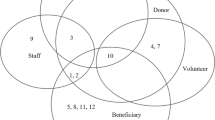Abstract
Why formulate a philosophy statement? How may this statement influence organizational life? Answers to these questions affirm the practical utility of a philosophy within a health care facility. In addressing the first question, consideration is given to the philosophical questions by whom, to whom, and for what purpose is the organization sent. Also considered are its purpose in relating to and mode of relating to its patients. The practical place of a philosophy is illustrated through the difference between for-profit and non-profit corporations. A close analysis of organizational structure, systems, and strategies details this difference.
Similar content being viewed by others
References
Buber, M.,Tales of the Hasidim: The Early Masters. New York, Schocken Books, 1947; p. 286.
—,Tales of the Hasidim: The Late Masters. New York, Schocken Books, 1948, p. 247.
Sisters of Mercy Health Corporation,A Procedural Handbook to Assist in: Understanding, Developing, and Implementing a Philosophy. Farmington Hills, Michigan, April, 1982.
Ibid. Sisters of Mercy Health Corporation.A Procedural Handbook to Assist in: Understanding, Developing, and Implementing a Philosophy. Farmington Hills, Michigan, April, 1982. p. i.
Athos, A.G., and Pascale, R.T.,The Art of Japanese Management. New York, Simon and Schuster, 1981; p. 202.
Von Ward, P.,Dismantling the Pyramid. Washington, D.C., Delphi Press, 1981; p. 188.
Delbecq, A.L., et al.,Matrix Organization: A Conceptual Guide to Organizational Development. Madison, Wisconsin, Graduate School of Business, Bureau of Business Research and Service, 1969, pp. 3–14.
John Paul II, “Laborem Exercens,” papal encyclical “On Human Work.” Rome. 1981. paragraph #20.
United States Catholic Conference, “Pastoral Letter on Health and Health Care.” Washington, D.C., November, 1981, paragraph #B4.
John Paul II, address at Montery, Mexico, January 31, 1979.
Mercy Health Center, “Interpretation of Philosophy Statement.” Dubuque, Iowa, 1982, p. 2.
Trend Analysis Program, American Council of Life Insurance, “Health Care: Three Reports from 2030 A.D.”Tap Report, #19, Spring, 1980, p. 1.
Ibid., Trend Analysis Program, American Council of Life Insurance, “Health Care: Three Reports from 2030 A.D.”Tap Report, #19, Spring, 1980, p. 1.
Ibid. Trend Analysis Program, American Council of Life Insurance, “Health Care: Three Reports from 2030 A.D.”Tap Report, #19, Spring. 1980, p. 1.
Mercy Hospital, “Philosophy Statement,” Johnstown, Pennsylvania, 1980.
Berger, G.,The Phenomenology of Time and Perspective. Centre d'Etudes Prospectives, Presses Universitaire de France, 1963.
Skinner, B.F.,Walden Two. New York, Macmillan Company, 1948.
Orwell, G.,1984. New York, Harcourt, Brace and Company, 1949.
Huxley, A.,Brave New World. New York, Doubleday, Doran and Company, 1932.
Rights and permissions
About this article
Cite this article
Willis, R.J. Philosophy in religious health care facilities. J Relig Health 22, 287–306 (1983). https://doi.org/10.1007/BF02279926
Issue Date:
DOI: https://doi.org/10.1007/BF02279926




